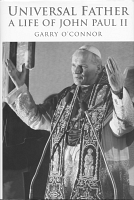Biographer traces life of Pope John II from his childhood
As a child in Wadowice, Poland, Karol Wojtyla experienced loss and discovery. He was the youngest of three children of Karol Wojtyla, Sr. and Emilia Kaczorowka. By the time he was born on May 18, 1920, his parents had already lost his sister, Olga. When he was 12, his mother died. His older brother, Edmund, a doctor, died in 1932 while treating patients of a scarlet fever epidemic. His father died in 1941.
Karol would witness Nazism, Communism and Marxism. Despite the challenges and the secrecy they demanded, Karol became an accomplished poet and playwright, as well as an actor known for playing romantic roles in the clandestine "Rhapsodic Theatre."
This early life of the man who was elected pope on Oct. 16, 1978 is documented by Garry O'Connor in "Universal Father: A Life of John Paul II," a book that will keep you glued to its pages and make you more appreciative of the work of history's longest living pope
As Karol grew, it became impossible not to notice the disappearance of his Jewish neighbors and members of the Jewish soccer team on which he played guard when one was needed.
He saw his Catholic and Jewish colleagues fall away as anti-Semitism grew. He spent time in the theater and played scenes with Regina Beers, who lived next door. Still, he broke off play to pray, often by the Vistula River, making him more aware of Poland's "checkered and tragic history."
Karol grew closer to the church, writing plays titled "Job" and "David," but he was also always on the watch for the Gestapo. His play "Jeremiah" reflected the suffering of Poland. He noted the gradual deterioration of Poland and watched as his neighbors were increasingly more dehumanized, and eventually disappeared. Still, he continued his secret seminary studies, and was ordained a priest by Archbishop Sapieha Nov. 1, 1946.
Like his childhood, Father Karol Wojita's priesthood was filled with ups and downs. With the support of Archbishop Sapieha, he was named a monsignor. On July 4, 1958, he was appointed titular bishop of Ombi and named auxiliary bishop of Krakow by Pope Paul VI. Still, O'Connor writes, he had a "growing anger over Nazism."
Archbishop Karol Wojita learned of love through anger, and when he was appointed the 263rd successor of St. Peter on Oct. 16, 1978, taking the name John Paul II, he went to his fellow Polish Cardinal Stefan Wyszynski and asked, "What do I do now?," O'Connor writes.
The book carefully recites the dangers of making statements about the treatment of the Poles and Jews lest any criticism would lead to more killing, but even as pope, John Paul II called for the more humane treatment of Poles, Jews, Catholics, and other persecuted people. He remained faithful to workers' unions like Solidarity, which began among the dockworkers of Warsaw.
"Universal Father: A Life of John Paul II" ends before the death of its subject, ending as he added his voice to those calling for more dignity for people of all races and religious persuasions.
Pope John Paul II died April 2, 2005 after a long illness. Twenty-six days later, the Holy Father Benedict XVI announced that the normal five-year waiting period beginning the cause of beatification and canonization would be waived for John Paul II. The cause was officially endorsed by Cardinal Camillo Ruini, vicar general for the diocese of Rome, June 28, 2005."
Universal Father: A Life of Pope John Paul II," by Garry O'Connor, Bloombury Publishing Company, New York and London, 2005, $24.95
© Copyright 2025 The Diocese of Salt Lake City. All rights reserved.


Stay Connected With Us